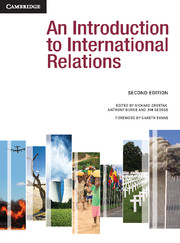Book contents
- Frontmatter
- Contents
- Tables, Figures and Boxes
- Contributors
- Preface and acknowledgements
- An Introduction to International Relations: The origins and changing agendas of a discipline
- 1 Theories of International Relations
- 1 International Relations Theory in an Age of Critical Diversity
- 2 Realism
- 3 Liberalism
- 4 Marxism and Critical Theory
- 5 Feminism
- 6 Postmodernism
- 7 Constructivism
- 8 Theories of Global Justice
- 2 The Traditional Agenda
- 3 The New Agenda
- Glossary of Terms
- Bibliography
- Index
- References
8 - Theories of Global Justice
from 1 - Theories of International Relations
- Frontmatter
- Contents
- Tables, Figures and Boxes
- Contributors
- Preface and acknowledgements
- An Introduction to International Relations: The origins and changing agendas of a discipline
- 1 Theories of International Relations
- 1 International Relations Theory in an Age of Critical Diversity
- 2 Realism
- 3 Liberalism
- 4 Marxism and Critical Theory
- 5 Feminism
- 6 Postmodernism
- 7 Constructivism
- 8 Theories of Global Justice
- 2 The Traditional Agenda
- 3 The New Agenda
- Glossary of Terms
- Bibliography
- Index
- References
Summary
Introduction
This chapter discusses the theories of international relations which have as their principal goal the transformation of the global international order so that it better meets the objectives of global justice. It begins with a discussion of the nature of justice as it is understood in the political context. It then addresses the cosmopolitan argument that principles of justice ought to apply to the world as a whole and not just within or between individual states. Next, it discusses the secondary argument that this requires significant reform of the relations between states and the democratising of the international realm. Finally, it examines the principal accounts of global justice including Rawlsian liberalism (see Boxes 8.1 and 8.3) and cosmopolitan democracy.
Unlike other theories of international relations, theories of global justice are explicitly evaluative theories. They seek to discuss and identify the proper rules for ordering society and the relationships between its constituent parts. In particular they assess the values which ought to guide social and political life and how they are embodied in institutions and practices. In the language of political theory they discuss ‘the right and the good’. They do not merely explain or understand politics but assess it normatively, on the basis of ethical and moral grounds. The core concerns of these types of theories are the meaning of justice, equality, freedom and rights, and their relationship to power, violence and interests. Until relatively recently theories of this type have been rare in the discipline. Normative or evaluative thought in international relations has mostly been concerned with the meaning of sovereignty and the norm of non-intervention rather than with justice. Cosmopolitan theorists, however, argue that the vocabularies of justice and democracy do apply to the relations between states and, furthermore, that there is a moral imperative to transform the international realm into one that better conforms to these values.
- Type
- Chapter
- Information
- An Introduction to International Relations , pp. 119 - 132Publisher: Cambridge University PressPrint publication year: 2011

